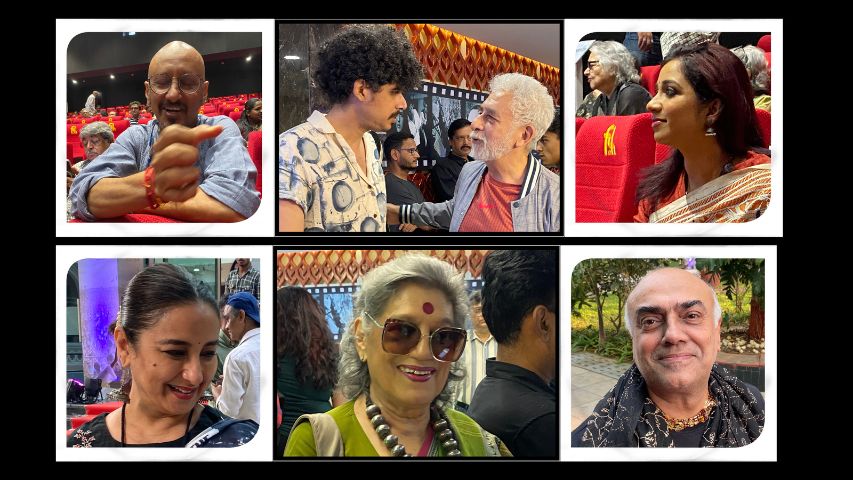-853X543.jpg)
MUJIB: THE MAKING OF A NATION
by Vinta Nanda October 27 2023, 12:00 am Estimated Reading Time: 5 mins, 41 secsThe much-anticipated biographical epic delves into the life of Sheikh Mujibur Rahman, the towering political figure of Bangladesh. “It is a must watch for every generation of us who belong to this region”, writes Vinta Nanda
The premiere of the film, Mujib: The making of a Nation, on the 25th October, in Mumbai, was a star-studded evening. An Indo-Bangladesh production, the film, on the life and times of Mujibur Rehman, the first prime minister of independent Bangladesh, could not have been made by anybody other than by Shyam Benegal.
Suffice is to say that only a man with a body of work, which has addressed injustice and discrimination (Ankur, Nishant), has put all its weight behind India’s shared history with her neighbors in the subcontinent (Discovery of India), and created a narrative series like Samvidhaan about the Indian Constitution, in the times when the ruling Right-Wing’s agenda is to rewrite it, could’ve given such an objective lens to a complex period in the region’s history spanning 50 years.
The Co-production Agreement for the film was signed in January, 2020 between Executive Producers - NFDC and Film Development Corporation (FDC), Bangladesh. The Ministry of Information Broadcasting, Govt. of India and the Ministry of Information Broadcasting, Govt. of Bangladesh are producers of the film. The film is a tribute to the great leader on his birth centennial and to mark the 50 years of Bangladesh’s formation.
We have witnessed across the world’s history, how a colonial mindset works. And how, when they become powerful, leaders leverage authority to expand boundaries. It was no different when the British were ruling undivided India for more than 300 years before they broke it to pieces and finally left in 1947. A hurriedly executed division of the subcontinent into two countries left the region shattered. And, the mindlessly implemented partition, which resulted in the displacement of millions and death of thousands, left a complicated West and East Pakistan with India right in the middle.
Although focused on the man, Mujibur, his childhood, his youth, his mentors, family, and of course, the multiple arrests and confinements he endured, Shyam Babu is able to successfully convey that ‘the destruction of a man can never demolish an idea’. The idea, in reference, here, is of freedom. The ‘idea’ is the indestructible objective and intent of indigenous populations across the world to protect their homelands, culture and languages over several decades and even millennia. It is evident, also, in the two wars taking place presently between Russia and Ukraine, and Israel and Palestine.

While the film voyages between Mujibur’s birth and death (17 March 1920 – 15 August 1975), its depth is in the subtext of the director’s narration - it keeps you upright and alert throughout the three-hour long film that is both, in the form of drama and documentary.
Shyam Babu tells you how nothing ever changed after 1975, not through his dialogues, but in nuance. And, that the politics of imperialism and expansionism weren’t any different in previous eras than they are today. It’s clear through the undertones, that the imperialist (in this case Pakistan) loses sight of the truth along the way, also its purpose, and power makes her delusional. Today of course, it is more normalised than ever before, for colonisers to falsely believe they have the divine powers to dominate cultures, to impose their Weltanschauung upon weaker countries, social, economic and military, in bids to reengineer evolution in ways that are suited only to their own progress.
Benegal, not surprising at all, without a single dialogue in the film to underline this fact, is successfully able to convey that the people of a land with a shared history of thousands of years cannot be divided in spirit. When there is injustice, the popular and intellectual forces within the divided lands compel governments to act in support for one another. The subcontinent was divided by religion in 1947, yet, it was its Muslim brethren, which a largely Hindu India reached out to when there was a genocidal pogrom taking place in East Pakistan in 1971.
Much has been written about the Bangladesh War of Independence, and also the role the then prime minister of India, Indira Gandhi played. She was called Maa Durga by none other than Atal Bihari Vajpayee, and ‘not for having defeated Pakistan, but for having aided Bangladesh’s freedom’. She had the courage, much against what the West-world had thought, to send Indian forces to Bangladesh and to bring Pakistan’s army to surrender itself. It comes through clearly from the release of over one lakh Pakistani prisoners of war, soon after the war, that for India the enemy was not another country but the dominance of non-secular and powerful right-wing conservative ideologies.
As the flawless second half of the film unfolds, one brief interview of Indira Gandhi from the archives appears and it reveals, in the most understated of ways, that in 1971 India fought against the transgressions of Pakistan to forcefully acculturate East Pakistan and to impose the Urdu language as a mother tongue upon its Bengali speaking people. This draws so many parallels to present India, the fight of certain states of the country, e.g. Tamil Nadu, to retain their regional languages and not allow the Hindi language to undermine them.
While the film primarily encapsulates the pivotal role of Sheikh Mujib in the struggle for Bangladesh's independence, it brilliantly captures the shared joy, love, and warmth of Mujib's family, juxtaposed against a nation's turbulent journey towards independence.
Stellar performances by actors Arifin Shuvoo (Mujibur Rehman) and Nusrat Imrose Tisha (Mujibur’s wife Renu), who worked for free and have taken only one Bangladeshi Taka (0.011 USD) as a token amount, need special mention because barely a couple of minutes into the film they cease to act and become the very people one has known and read about extensively while growing up.
The music score by Shantanu Moitra is spellbinding, it blends seamlessly to the narrative just like the costumes, which must have been a humongous task to achieve, by Pia Benegal. The screenplay by Atul Tiwari and Shama Zaidi, skips a beat or two in the first half, but soon captures each moment of history with immense ease, holding you captivated till the end.
‘Mujib: The making of a nation’ was released theatrically on October 13, 2023 in Bangladesh and has received a roaring response breaking all box office records. It will be released by Panorama Studios International in India and overseas on October 27, 2023. Speaking on the occasion, Shyam Benegal said, "Clearly I enjoyed making the film. It was a honour for me that Bangladesh PM and Mujib's daughter liked the film".






-173X130.jpg)
-173X130.jpg)
-173X130.jpg)
-173X130.jpg)
-173X130.jpg)
-173X130.jpg)